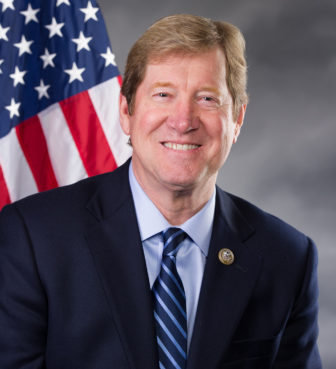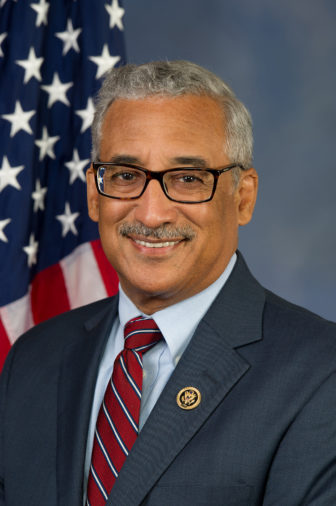
U.S. Rep. Jason Lewis
WASHINGTON — Congress will pass long-awaited juvenile justice reforms this legislative year, a key Republican representative believes.
“I’m going to go out on a limb and say yes,” Jason Lewis, R-Minnesota, said in an interview here last week. “I think we’re getting close. I’m confident we will, because we need to.”
The Juvenile Justice Delinquency and Prevention Act hasn’t been reauthorized in two decades. Lewis and Virginia Democratic Rep. Bobby Scott pushed through a host of reforms in HR 1809, which passed the House unanimously. (Both Lewis and Scott are members of the House Committee on Education and The Workforce.) A similar bill passed the Senate, but it has stopped there because Sen. Tom Cotton, R-Arkansas, has demanded that House Republicans strip out language forbidding judges from jailing youths for status offenses — running away from home, ditching school, etc. — before the bill goes to conference committee.
“Do we really want to throw somebody in jail for that?” Lewis said. “I don’t think so. But some states do. I think that’s dumb. It’s too costly and it’s dumb and we shouldn’t be doing that.”
Congressional staffers have been working on compromise language that would give judges options other than jailing those who violate valid court orders, Lewis said. It’s still early in the process, but he’s confident that something can be worked out.
“I don’t think it will be a hard limit” on jailing for status offenses, Lewis said. “Cotton probably won’t sign off on a hard limit, but we’ll have more options.”
Cotton’s office didn’t respond to requests for comment.
The negotiations are playing out along two timelines. The first is the congressional calendar — if the bill doesn’t move out of conference committee by the end of the year, it will die and will have to be reintroduced in the next Congress. The second is a political calendar — Lewis, a freshman whose district spans some of the Twin Cities’ outer suburbs as well as rural Minnesota, barely won his seat over Democratic candidate Angie Craig in 2016. Many congressional Republicans are worried that President Donald Trump’s unpopularity will cause a blue wave this November that will push Republicans such as Lewis out of office.

U.S. Rep. Bobby Scott
Lewis, a former radio host, has been burnishing his centrist credentials — with his commitment to criminal justice reform as a kind of Exhibit A. But unlike many self-advertised centrists, Lewis doesn’t argue just for splitting differences. He sees his work on the juvenile justice bill as a precursor to work on the SAFE Justice Act, which he argues would bring the same reforms to the adult system as he hopes to bring to the juvenile justice system. And he considers that to be the essence of conservatism.
“Quite frankly, we have too many federal, criminal statutes,” Lewis said. “I think the Constitution mentions just three crimes and we’ve got 4,500 statutes. All we’re trying to do is reauthorize it so we can get some accountability and measurements on evidence-based sentencing. If that isn’t conservative, I don’t know what is.”
There was a time, until very recently, when more Republicans spoke like Lewis did. After years of throw-away-the-key rhetoric and policy from both parties, a great many conservatives were willing to rethink their approach to juvenile and criminal justice. But Donald Trump’s campaign — where "law and order" was a key selling point — has put libertarian-leaning Republicans in a bind.
Lewis’ efforts here have been heroic, said Marcy Mistrett, chief executive officer of the Campaign For Youth Justice, a group that has been lobbying for many of the reforms in the pending legislation for decades.
For more information on juvenile justice reform trends, go to JJIE Resource Hub
“He has been a fantastic champion — really came in and stepped into his predecessor’s shoes,” Mistrett said, referring to former Rep. John Kline, a Republican. “He has met with the Senate champions, tweets about this regularly and gave impassioned statements in the committee hearing.”
The reforms in the juvenile justice bill are long overdue — and desperately needed, said Roger Pohlman, chief of police in Red Wing, a small town in Lewis’ district.
“We’ve tried so many things. And I know for years we probably thought we could arrest our way out of the problem. And I tell you with budget cuts and the workloads everybody has, that hasn’t always been the case. People are starting to realize there’s a better way that we can be more proactive,” Pohlman said.
As Lewis sees it, there is simply no other option.
“Do we want to waste precious resources … on incarcerating a kid for running away from school? Do you really want to do that?” he asked. “The bottom line is, in so many cases, you throw a young kid who made a mistake in with hardened criminals, you’re going to create a criminal.”
Pingback: Friday News Roundup: February 16, 2018 – Justice Programs Office
Pingback: GOP Congressman Confident Juvenile Justice Delinquency and Prevention Act will Pass - Juvenile Justice Information Exchange - Crime Free Kids
Ditto This is totally consistent with the 1974 bi-partisan Act the overwhelmingly passed the House and Senate and was signed by President Ford in Sept.1974.
I was Sen. Birch Bayh’s ( the Author of the Act) Chief Counsel(1971-77) and the Admin. of OJJDP from 1977 June(confirmed by the Senate) until May 1979. John Forhan was my Chief Counsel at OJJDP
Great job Reps Lewis and Scott! Keep up the good work and keep the spirit of 1974 alive.